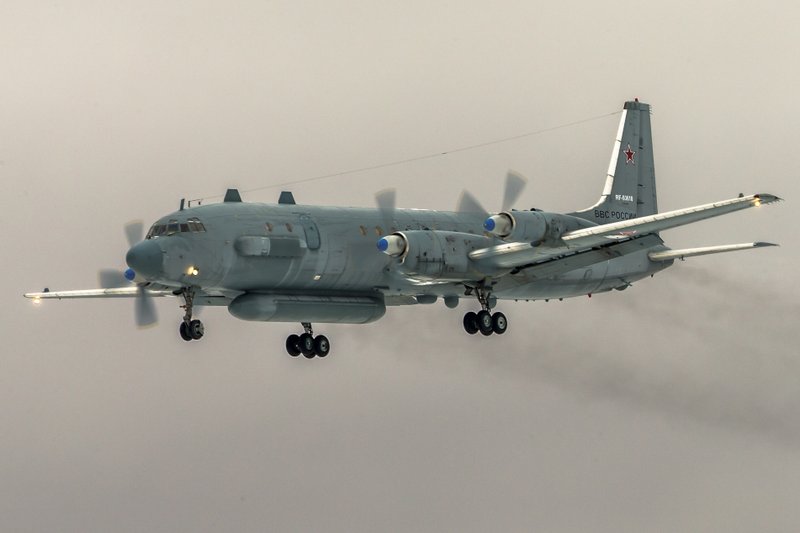MOSCOW -- A high-level Israeli military delegation visited Moscow on Thursday to present detailed information related to the downing of a Russian warplane by Syrian forces that responded to an Israeli air raid.
All 15 crew members on board the Russian Il-20 reconnaissance plane were killed when it was downed Monday by Syrian air defense forces that mistook it for Israeli jets. The incident threatened to derail the close security ties between Russia and Israel.
Israeli Prime Minister Benjamin Netanyahu quickly called Russian President Vladimir Putin to express sorrow over the death of the plane's crew, blamed Syria and offered to share detailed data.
Syrian President Bashar Assad also sent a telegram to Putin expressing his "deep condolences" for the servicemen's deaths and blamed Israeli "aggression." Asked Thursday if Russia was satisfied with Syria's message, Kremlin spokesman Dmitry Peskov said only, "the telegram has been received," Tass reported.
Russian Foreign Ministry spokesman Maria Zakharova said Thursday further investigation is needed to establish what happened and Russia is awaiting information from the Israeli side. Russia has "strong, historical ties" with Israel, she told a weekly briefing Thursday.
Netanyahu dispatched the Israeli air force chief, Gen. Amikam Norkin, to Moscow on Thursday to provide more details on the events.
Norkin's mission in Moscow is to "convince the Russians it was not our mistake, it was not prepared deliberately and we did whatever was needed to prevent any harm to any Russian forces," said Yaakov Amidror, a former Israeli national security adviser who is now a senior fellow at the Jerusalem Institute for Strategic Studies.
"It may be that after the tragic loss of life and the downed plane, Russia-Israel relations will grow thicker," Dmitri Trenin, head of the Moscow Carnegie Center, said on Twitter.
Netanyahu said Thursday that while voicing regret over the deaths, he told Putin that "the root of the problem is Iran's attempt to use Syrian territory for attacks against Israel and to arm our enemies, such as Hezbollah."
"I told him that we have the right of self defense," Netanyahu said, adding that "there is also very great importance to maintaining the security coordination between Israel and Russia."
He said he dispatched Norkin to Moscow with a double objective: "One, to continue defending our citizens, and two, to preserve the cooperation between our two countries."
On Thursday, a delegation of Israeli military officers led by Norkin held several meetings in Moscow with their Russian counterparts.
The Israeli military said in a statement that they presented the situation report regarding the plane's downing, as well as the pre-mission information and the findings of an Israeli military inquiry.
"The meetings were held in good spirits and the representatives shared a professional, open and transparent discussion on various issues," the Israeli military said. "Both sides emphasized the importance of the states' interests and the continued implementation of the deconfliction system."
The Israeli military has said its fighter jets were targeting a Syrian military facility involved in providing weapons for Iran's proxy Hezbollah militia and insisted it warned Russia of the coming raid in accordance with deconfliction agreements. It said the Syrian army fired the missiles that hit the Russian plane when the Israeli jets had already returned to Israeli airspace.
But the Russian Defense Ministry charged that the Israeli warning came less than a minute before the strike, leaving the Russian aircraft in the line of fire. It accused the Israeli military of deliberately using the Russian plane as a cover to dodge Syrian defenses and threatened to retaliate.
The Russian military made no comment after Thursday's meetings with the Israeli delegation.
While the Russian Defense Ministry blamed the plane's loss on Israel, Putin quickly sought to defuse tensions Tuesday, pointing at "a chain of tragic accidental circumstances."
The Israeli military also noted that its delegation "presented the ongoing Iranian attempts to establish its military presence in Syria and to transfer strategic weapons to the Hezbollah terror organization."
Moscow has played a delicate diplomatic game of maintaining friendly ties with both Israel and Iran. In July, Moscow struck a deal with Tehran to keep its fighters 53 miles from the Golan Heights to accommodate Israeli security concerns.
Information for this article was contributed by Vladimir Isachenkov, Nataliya Vasilyeva and Josef Federman of The Associated Press; and by Henry Meyer and Jonathan Ferziger of Bloomberg News.
A Section on 09/21/2018

